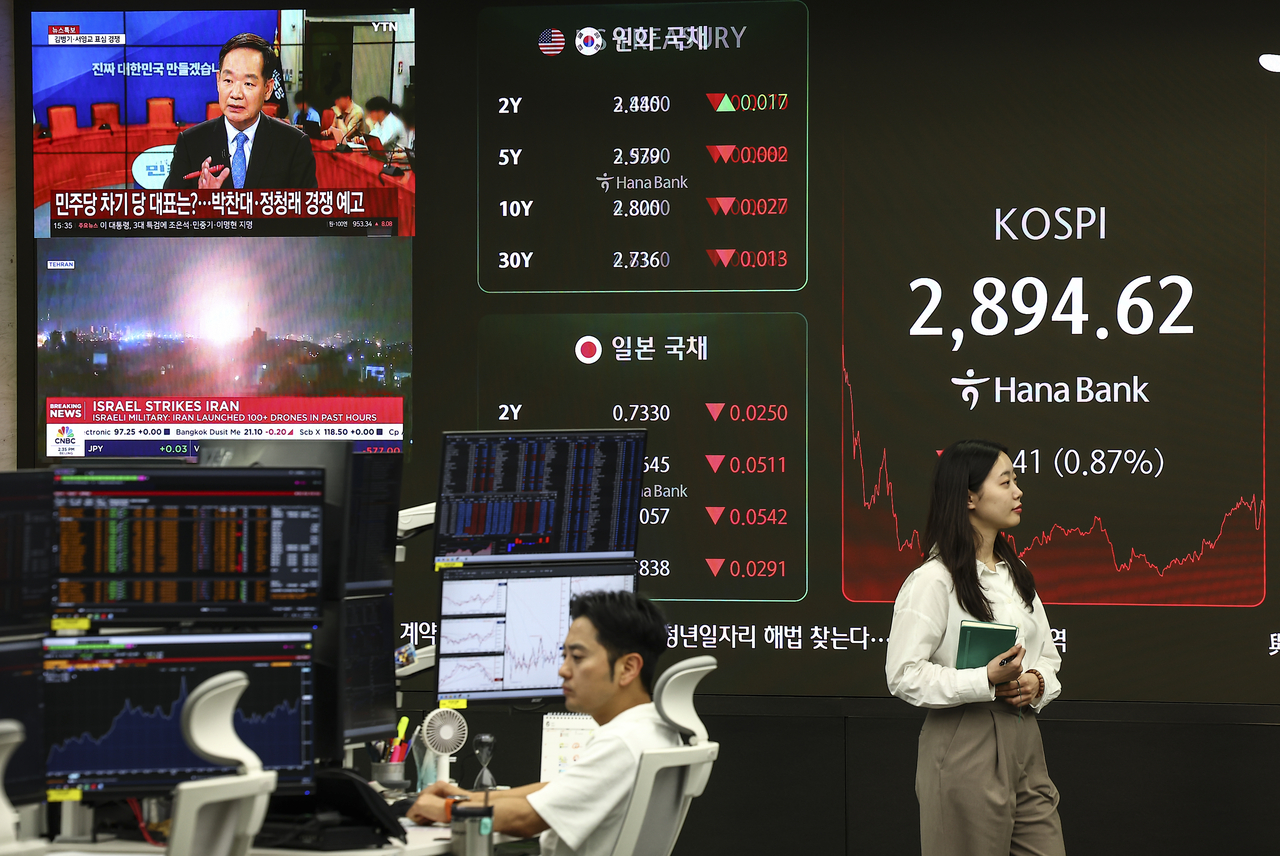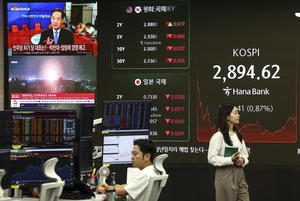 A TV screen on the left shows news about Israel’s airstrikes on Iran as the Kospi closes down 0.87 percent on Friday at a dealing room in Hana Bank’s headquarters in central Seoul. (Newsis)
A TV screen on the left shows news about Israel’s airstrikes on Iran as the Kospi closes down 0.87 percent on Friday at a dealing room in Hana Bank’s headquarters in central Seoul. (Newsis) Rising global volatility triggered by escalating military tensions in the Middle East poses fresh risks for Korea’s export-reliant economy, already under strain from growing trade protectionism and US tariff hikes.
In May, Korean exports declined for the first time in four months, signaling that global trade friction is beginning to weigh on the economy.
“A prolonged surge in oil prices could further jeopardize growth, which is already projected to fall below 1 percent this year,” said Jung Kyu-chul, head of economic forecasting at the Korea Development Institute.
“Higher oil prices will squeeze manufacturers by raising import and production costs, delivering a direct blow not just to industry, but to domestic demand and the broader economy.”
The benchmark Kospi, which had been leading G20 equity markets, snapped its rally on Friday as investor sentiment was rattled by Israel’s airstrikes on Iran, sparking fears of a wider regional conflict. The Kospi dropped 0.87 percent after touching a three-year high of 2,920 on Thursday. From May 12 to June 14, the index surged 11 percent—from 2,607.3 to 2,894.6 — outpacing Indonesia’s 4.88 percent gain and Canada’s 4.24 percent rise.
The rally had been fueled by renewed optimism following the June 4 inauguration of President Lee Jae-myung, which ended a six-month political stalemate and triggered a return of foreign capital after 10 straight months of net outflows.
But Friday’s geopolitical shock reverberated across markets. Brent crude jumped more than 10 percent intraday — its largest spike since 2022 — before settling up 7 percent. West Texas Intermediate rose 7.62 percent, stoking fears of supply disruptions.
Safe-haven demand surged. Gold climbed 1.6 percent to $3,457 an ounce in New York, while Korean gold prices rose 2.34 percent to 150,530 won per gram, breaching the 150,000-won mark for the first time since early May.
The Korean won weakened, touching an intraday low of 1,371 against the US dollar before closing at 1,369.6.
Despite the volatility, analysts say the local market should weather the storm unless the conflict intensifies.
“As long as the Israel-Iran conflict doesn’t evolve into a full-scale war, the impact on local markets is likely to remain limited,” said Shin Seung-hwan, analyst at Samsung Securities. “Given the recent steep rally, the tensions could prompt a short-term correction, but any pullback is expected to remain modest.”
Still, with no signs of de-escalation, caution is warranted. “We need to stay alert to deepening geopolitical tensions,” said Lee Jae-won of Shinhan Securities. “If oil and other commodity prices continue to climb, that could fuel inflationary pressure and dampen expectations for rate cuts.”
jwc@heraldcorp.com
